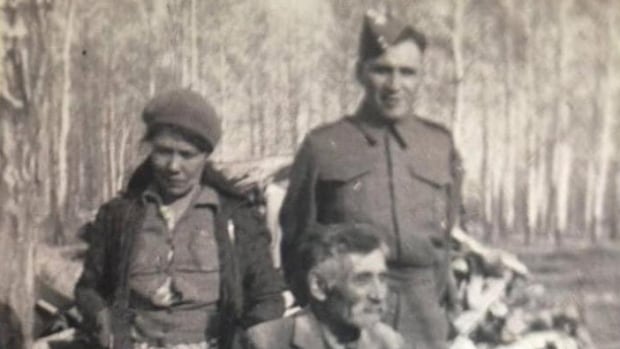
Legacy of Indigenous soldiers now being preserved in northwestern Alberta
CBC
A researcher in Grande Prairie, Alta., has undertaken a project to ensure past Indigenous soldiers and veterans are recognized for their sacrifices in both world wars.
Renee Charbonneau, who runs the Veterans Memorial Gardens in Grande Prairie, has been working for seven years to collect the stories of Indigenous soldiers from northwestern Alberta who were killed in action overseas. Elders in the region and Indigenous genealogists have helped her.
Charbonneau, who is not Indigenous but comes from a military family, considers the subject extremely close to her heart.
"Why wouldn't we thank them for their service? Why wouldn't we recognize that they served?" she told CBC News.
"Why, for so many years, did they have to be on the sidelines here in Canada, watching Remembrance Day ceremonies — but as a group not [be] allowed to lay a wreath? They could do it as an individual, but they weren't allowed to do it in a group."
On the Veterans Affairs Canada website, the federal government acknowledges it mistreated Indigenous veterans during that time. It states Canada expropriated hundreds of thousands of acres of reserve lands while Indigenous people served the country, some of which was given to non-Indigenous people as part of a program that offered farmland to returning veterans.
Indigenous veterans were often denied this program and other full veteran benefits, and faced other mistreatment and discrimination when they returned to Canada, the website says.
"When you work in such a dangerous situation together, you become brothers in arms and then you come home," Charbonneau said.
"You have all of these situations where, when they came home, your Indigenous brother wasn't allowed to go to the legion with you to have a beer at the bar, because the Liquor Act and the Indian Act said they weren't Canadian citizens."
Monday marks Remembrance Day, when Canadians honour soldiers who died while serving the country.
Friday marked National Indigenous Veterans Day, which Charbonneau finds to be an especially important day to reflect and try to educate those in her community.
"It's sad that they have to be singled out for their service to be recognized," said Charbonneau.
"[National] Indigenous Veterans Day is about so much more than their service. It's about their treatment after service. It's about them not being welcomed by the establishment — and this is their way of never forgetting."
The Canadian military did not track details about race, ethnicity and region of origin of those who served during the world wars, Veterans Affairs Canada said in a statement to CBC News.





















 Run 3 Space | Play Space Running Game
Run 3 Space | Play Space Running Game Traffic Jam 3D | Online Racing Game
Traffic Jam 3D | Online Racing Game Duck Hunt | Play Old Classic Game
Duck Hunt | Play Old Classic Game